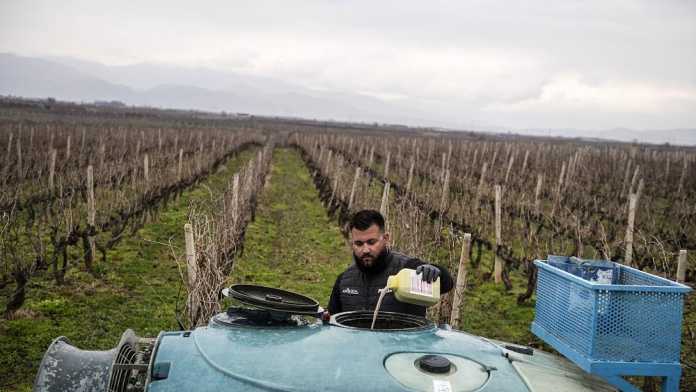The European Commission wants to cut the use of chemical pesticides in half by 2030, as part of its latest plan on sustainability and biodiversity.
The EU institution’s announcement, a piece of its ambitious Farm to Fork strategy, aims to make food systems more healthy and environmentally-friendly.
The Commission said it does not want to outright ban the use of chemical pesticides, however, despite the fact that the proposed 50% target would be legally binding for member states.
But Frans Timmermans, the Commissioner in charge of the bloc’s landmark Green Deal, said that under the proposals there would be a complete end to the use of chemical pesticides in some public areas.
“By 2030 half of chemical pesticides should be replaced by alternatives, with practices like crop rotation and technologies like precision farming,” Timmermans told reporters in Brussels on Wednesday. “We also propose to prohibit all pesticide use in sensitive areas like schools, hospitals, parks and playgrounds.”
Member states would have to submit regular reports on their progress as part of the new regime. EU funds would also be available over the next five years to cover the cost of any new requirements.
But many governments already oppose the new proposals, with Italian MEP Herbert Dorfmann telling Euronews the timing is wrong, given the current food crisis.
“The time is completely inappropriate to make this proposal because we are in a moment where food is needed in Europe,” Dorfmann said on Wednesday. “We are again in a debate on food security in Europe and to propose both of these regulations now is simply inappropriate.”
Green politicans in the European Parliament disagree with this assesment, however.
Pär Holmgren MEP said that the EU needs to set a date for a complete end to the use of chemical pesticides.
“When it comes to pesticides, we really need a full end date,” the Green MEP told Euronews. “Some day we will need to understand the huge divide between sustainabilty and non-sustainability. And as long as we keep using pesticides in the long-run, we will run into more problems than the few benefits that we have and especially have had from that sort of agriculture.”
Copa Cogeca, the largest European farmers union, said in a statement that it is in favour of reducing the use of chemical pesticides, but not at any cost.
“The European farming community supports the global objective of reducing plant protection products. To do so, European farmers and Agri-cooperatives need to be provided with available, safe, effective and affordable tools still to be developed following cutting-edge scientific progress.
“Focusing on stricter rules will not solve the underlying problems for plant protection: banning different products without having sufficient effective alternatives is not an efficient approach.”
The plans also include a mandatory nature resoration target for countries to repair 20% of damaged ecosystems by 2030, the idea being to return nature to all areas, including in forests, farmlands and urban areas.
Virginijus Sinkevičius, the European Commissioner for the Environment told Euronews in an exclusive interview that the idea of nature restoration is win-win for everyone.
“We should stop living in a myth that acting for nature, restoring nature is just costs and no benefits. And our impact assessment shows that one invested euro brings eight euros of benefit,” Sinkevičius said.
One of the main goals, is to reverse the decline of pollinators, like bees, which experts say actually increases farming yields and helps naturally restore ecosystems.
The plans will need approval from the European Parliament and European Council before they can become law.













